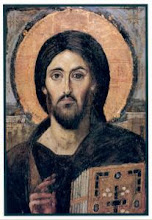Saturday, June 20, 2009
Freaking Out on a Sea of Despair.....Someone Wake up Jesus!
The church nave (the central part of the church) is often referred to as an upside down ship. In a traditional setting if we stop and look at the high pitched roof with beams crisscrossing the space inbetween, we can easily imagine the parish building itself as a vast ship; a ship named Casa di Dio (God’s House). God’s House is a refuge that often rides the stormy waves and perilous seas of life, tossed about by the winds of fury. And while God remains faithful, it is the crew and passengers that seem to consistently fall into fear and disarray. The winds and violent storms of life often arise out of nowhere, raining down doubt and ambiguity upon our lives. Yet despite the fact that God’s House takes on water and on occasion appears to ride low in the waters of despair, Christ is our ever present Captain and source of strength. Jesus will keep us afloat providing us with comfort and peace (when we allow him too!). We often forget that in Christ Jesus the storms will pass and the seas will calm. But just like the disciples on that frightening evening as they were caught in a vicious storm in the middle of the Sea of Galilee, we too find ourselves in panic mode and experiencing a whole range of terrifying fear.
The disciples were mostly sea worthy men. Several of them were seasoned fishermen and would certainly know and have experienced the temperamental mood swings of the sea. The Sea of Galilee is notorious for storms which brew and move in literally out of nowhere. As the Wind blows south down the Jordan River and through deep canyons that feed into the large lake, it picks up intensity and speed which it ravenously releases onto the open water. Fishermen in this region are all too familiar with the fickle nature of Galilee. It can be calm one moment and in the very next, a literal rain of terror. This is why it is so perplexing in Mark’s Gospel that these seasoned fishermen who are now Jesus’ disciples would so easily panic in this storm. One would think or assume they would be right at home on the temperamental sea. Obviously this was no ordinary storm.
As we read the Gospel of Mark a reality begins to surface and take shape. Perhaps this was no ordinary storm. It was made more intense and terrifying because the disciples were increasingly seeking and finding security in the presence of Jesus, and not their own selves. A subtle spiritual transference was quietly occurring as Jesus’ followers began to place their true reliance on him. The Adversary would certainly wish to have derailed God’s divine mission of hope and freedom found in Christ. Even though Satan couldn’t trick, intimidate or mislead Jesus, there was always the human element that was most vulnerable and susceptible to the Devil’s deception. Since he couldn’t tempt or derail Jesus and his mission, the old Adversary attacks what he perceives to be the weak link in God’s creation. You got it! The Church; the very place of refuge and hope is now the primary target of assault by Satan. And believe me, the Adversary often has a “field day.”
Riding on the stormy seas of gossip, schism, rumors and personal motive, the Adversary swoops down on God’s House like a sudden and violent storm. I imagine out there on the Sea of Galilee as Jesus rested peacefully in the stern, the storm that arose probably brought out the worst in the disciples personalities. These men remind us that in times of trouble and fear, if we are not spiritually grounded in a life of faith and service to Christ Jesus, the very brokenness of our humanity surfaces, causing the strong personal desire to control our environment. I’m certain that on that fishing boat there were more than a few barbs exchanged between the disciples. I am sure that the anxiety created out of faithless fear and self-preservation brought every raw emotion and hostile remark to the surface. This became an intense and driving storm, one that threatened the very life of the crew and ship. The Adversary threw a huge tempest in their path and waited for the crew and passengers to self-destruct. But as we all know, Jesus didn’t allow that to happen. With only a two words, “Be still” the rough seas calmed and the storm was dispelled.
How often do we call on the presence of Christ to calm the storms we face in and outside of the church? The disciples intuitively turned to Jesus in their despair, which speaks well of their reliance on him, yet they still struggled to understand his identity as the Messiah; the Christ; the One to Come; the Divine Liberator and Pioneer of Faith. They continued to struggle with that innate need to control their environment. They continued to struggle with the concept of faith. And guess what? 2000 years later we still do the exact same thing. Its easy to claim to love, follow and have faith in Jesus; particularly when life’s seas are smooth. Its easy to get along with one another in the church when life is calm and folks go unchallenged or unthreatened by change, authority or conflict. However, at the first sight of rain this fine balance is easily upset, as we often forget that Christ is in the stern with us.
Most of us are familiar with John Wesley; the great 18th c. evangelist to the American English colonies. He spread the Good News of Jesus faithfully in the age called “The Great Awakening.” Trust me; John Wesley could hardly have been called a faint-hearted or easily intimidated person. But there were times when even he lost his nerve and struggled with his faith. During one of Wesley's several Atlantic crossings, a frighteningly fierce storm broke out. The violent nature of this storm was terrible. It pitched and tossed the ship about on its rough seas; threatening to sink her along with the crew and passengers. While Wesley and others clung to their bunks in fear and doubt, a community of Moravians, traveling to their new homeland, calmly gathered to hold their daily worship service. Despite the vicious storm and its fury, they gathered in sincere faith to sing praises to God. Watching these Moravians, who were unperturbed by the hounding winds and crashing waves, Wesley realized he was witnessing a truly “waterproof faith.” From that moment on, John Wesley prayed that God would give him the ability to likewise ride out life's storms with the same confidence he witnessed in the Moravians.
Whatever storms we face in our personal lives; whatever tempests threaten those of us sailing aboard this vessel called the Church; know this – Christ is our faithful Captain who calms the winds, restores peace and brings comfort. Trust in Christ and allow him to be our navigator. The storms will come and go, yet Jesus is calm and steady. Throw all your personal desires for control overboard and embrace the winds of change. Unencumbered, Jesus will lead us into a deeper, richer and more nurturing life of faith and service.
The disciples were mostly sea worthy men. Several of them were seasoned fishermen and would certainly know and have experienced the temperamental mood swings of the sea. The Sea of Galilee is notorious for storms which brew and move in literally out of nowhere. As the Wind blows south down the Jordan River and through deep canyons that feed into the large lake, it picks up intensity and speed which it ravenously releases onto the open water. Fishermen in this region are all too familiar with the fickle nature of Galilee. It can be calm one moment and in the very next, a literal rain of terror. This is why it is so perplexing in Mark’s Gospel that these seasoned fishermen who are now Jesus’ disciples would so easily panic in this storm. One would think or assume they would be right at home on the temperamental sea. Obviously this was no ordinary storm.
As we read the Gospel of Mark a reality begins to surface and take shape. Perhaps this was no ordinary storm. It was made more intense and terrifying because the disciples were increasingly seeking and finding security in the presence of Jesus, and not their own selves. A subtle spiritual transference was quietly occurring as Jesus’ followers began to place their true reliance on him. The Adversary would certainly wish to have derailed God’s divine mission of hope and freedom found in Christ. Even though Satan couldn’t trick, intimidate or mislead Jesus, there was always the human element that was most vulnerable and susceptible to the Devil’s deception. Since he couldn’t tempt or derail Jesus and his mission, the old Adversary attacks what he perceives to be the weak link in God’s creation. You got it! The Church; the very place of refuge and hope is now the primary target of assault by Satan. And believe me, the Adversary often has a “field day.”
Riding on the stormy seas of gossip, schism, rumors and personal motive, the Adversary swoops down on God’s House like a sudden and violent storm. I imagine out there on the Sea of Galilee as Jesus rested peacefully in the stern, the storm that arose probably brought out the worst in the disciples personalities. These men remind us that in times of trouble and fear, if we are not spiritually grounded in a life of faith and service to Christ Jesus, the very brokenness of our humanity surfaces, causing the strong personal desire to control our environment. I’m certain that on that fishing boat there were more than a few barbs exchanged between the disciples. I am sure that the anxiety created out of faithless fear and self-preservation brought every raw emotion and hostile remark to the surface. This became an intense and driving storm, one that threatened the very life of the crew and ship. The Adversary threw a huge tempest in their path and waited for the crew and passengers to self-destruct. But as we all know, Jesus didn’t allow that to happen. With only a two words, “Be still” the rough seas calmed and the storm was dispelled.
How often do we call on the presence of Christ to calm the storms we face in and outside of the church? The disciples intuitively turned to Jesus in their despair, which speaks well of their reliance on him, yet they still struggled to understand his identity as the Messiah; the Christ; the One to Come; the Divine Liberator and Pioneer of Faith. They continued to struggle with that innate need to control their environment. They continued to struggle with the concept of faith. And guess what? 2000 years later we still do the exact same thing. Its easy to claim to love, follow and have faith in Jesus; particularly when life’s seas are smooth. Its easy to get along with one another in the church when life is calm and folks go unchallenged or unthreatened by change, authority or conflict. However, at the first sight of rain this fine balance is easily upset, as we often forget that Christ is in the stern with us.
Most of us are familiar with John Wesley; the great 18th c. evangelist to the American English colonies. He spread the Good News of Jesus faithfully in the age called “The Great Awakening.” Trust me; John Wesley could hardly have been called a faint-hearted or easily intimidated person. But there were times when even he lost his nerve and struggled with his faith. During one of Wesley's several Atlantic crossings, a frighteningly fierce storm broke out. The violent nature of this storm was terrible. It pitched and tossed the ship about on its rough seas; threatening to sink her along with the crew and passengers. While Wesley and others clung to their bunks in fear and doubt, a community of Moravians, traveling to their new homeland, calmly gathered to hold their daily worship service. Despite the vicious storm and its fury, they gathered in sincere faith to sing praises to God. Watching these Moravians, who were unperturbed by the hounding winds and crashing waves, Wesley realized he was witnessing a truly “waterproof faith.” From that moment on, John Wesley prayed that God would give him the ability to likewise ride out life's storms with the same confidence he witnessed in the Moravians.
Whatever storms we face in our personal lives; whatever tempests threaten those of us sailing aboard this vessel called the Church; know this – Christ is our faithful Captain who calms the winds, restores peace and brings comfort. Trust in Christ and allow him to be our navigator. The storms will come and go, yet Jesus is calm and steady. Throw all your personal desires for control overboard and embrace the winds of change. Unencumbered, Jesus will lead us into a deeper, richer and more nurturing life of faith and service.
Wednesday, June 17, 2009
Giving It Away to Keep It…Living a Christ Centered Life
I think most of us in the Church would agree that a Christ centered life is a gift worth sharing with others (a spiritually demanding gift I might add). Yet sharing of ourselves without condition or assurance is often challenging and difficult. Giving without concern for the self, and sharing through our vulnerability are rather alien concepts in today’s world – but so often that is how Jesus’ counter cultural teachings are perceived – outlandish! We live in a very individualistic society; one that teaches us to put ourselves first, seize as much power and control as possible, and a society that often teaches us to measure our self-worth based on the opinions of others. Think for one moment - how many times do we seek validation from outside sources? How many times do we base our success and failures on the reaction of our peers? This is just another form of self-centeredness and completely contrary to a life in Christ. Yet what are we supposed to do? We are after all human beings! Perhaps we should look deeper into what it means to live a Christ centered life.
We exist in a world in which we consistently experience a tug towards superficial achievements where success tends to be measured by worldly standards. Perhaps we have days in which we feel torn in several directions all at once. Those are the kinds of days in which I often feel it is everything I can do to take care of myself, much less give of myself to anyone else! It is hard not to put ourselves first in a society that teaches us might makes right, success is measured by how much worldly wealth we can accumulate, or how many goals we can accomplish in a day. Yet in contrast to the hustle and bustle of this world and it's standards, Jesus calls us to a life of complete and utter humility, poverty and a lifestyle of continuous self-giving (one without expectation of return or pay back). The counter culture love of God is radical in its nature. It knows nothing less than complete surrender and self-abandonment.
The very mystery and nature of God as Trinity celebrates self-abandoning love in diversity. And while we can debate and discuss the mystery of God, what is most important is to not lose sight of God’s pure benevolence; a gift that expects nothing in return. The economy of God is unconditional and ecstatic love for the other. In God there is no individual, but community. So what does that mean for us? Well, a life in Christ is all about acceptance of the self; the person God made us. It also means the acceptance of the beautiful diversity of all God’s people. The economy of God is not based on a fiduciary system, trade or the stock market. Instead the economy of God is the rock solid gift of life that is lived, shared and grounded in the community of faith. When we are initiated into the Body of Christ and immersed into the community of faith we die to our old selves and take on a new life, not only for ourselves, but for the sake of others as well. Just as the mystery of God is three divine “Persons” yet one being, so too do we become one with each other, yet remain personally valued and blessed with unique spiritual gifts. In other words, God calls us to build and rebuild relationships with others through the sharing of ourselves without condition. God invites us to celebrate our individual gifts as pieces of the puzzle that complement the community as a whole. Life in the community of the church recognizes that while we are diverse in nature, we need each other! A life in Christ is an immersion into unconditional love for God and our neighbor. Where many of us balk is that a genuine life in Christ requires nothing less than total self-sacrifice and self-abandonment. That is hard! Yet a life shared with others is a life that is constantly receiving the blessings of others and then selflessly passing along the gifts we receive. In the economy of God this exchange is a perfect cycle. But for human kind and our relationships, let’s just say we fall way short.
In this Ordinary time in the liturgical life of the church (the season of Pentecost), it is my sincere hope we will all continue to practice this cycle of self-giving love, even though we are far from perfect. The more we share of ourselves, the more vulnerable we all become as a community. It is in that vulnerability that sweet surrender occurs. It is in surrender that we find the meaning of unconditional love and service, sharing from our very poverty rather than excess.
We exist in a world in which we consistently experience a tug towards superficial achievements where success tends to be measured by worldly standards. Perhaps we have days in which we feel torn in several directions all at once. Those are the kinds of days in which I often feel it is everything I can do to take care of myself, much less give of myself to anyone else! It is hard not to put ourselves first in a society that teaches us might makes right, success is measured by how much worldly wealth we can accumulate, or how many goals we can accomplish in a day. Yet in contrast to the hustle and bustle of this world and it's standards, Jesus calls us to a life of complete and utter humility, poverty and a lifestyle of continuous self-giving (one without expectation of return or pay back). The counter culture love of God is radical in its nature. It knows nothing less than complete surrender and self-abandonment.
The very mystery and nature of God as Trinity celebrates self-abandoning love in diversity. And while we can debate and discuss the mystery of God, what is most important is to not lose sight of God’s pure benevolence; a gift that expects nothing in return. The economy of God is unconditional and ecstatic love for the other. In God there is no individual, but community. So what does that mean for us? Well, a life in Christ is all about acceptance of the self; the person God made us. It also means the acceptance of the beautiful diversity of all God’s people. The economy of God is not based on a fiduciary system, trade or the stock market. Instead the economy of God is the rock solid gift of life that is lived, shared and grounded in the community of faith. When we are initiated into the Body of Christ and immersed into the community of faith we die to our old selves and take on a new life, not only for ourselves, but for the sake of others as well. Just as the mystery of God is three divine “Persons” yet one being, so too do we become one with each other, yet remain personally valued and blessed with unique spiritual gifts. In other words, God calls us to build and rebuild relationships with others through the sharing of ourselves without condition. God invites us to celebrate our individual gifts as pieces of the puzzle that complement the community as a whole. Life in the community of the church recognizes that while we are diverse in nature, we need each other! A life in Christ is an immersion into unconditional love for God and our neighbor. Where many of us balk is that a genuine life in Christ requires nothing less than total self-sacrifice and self-abandonment. That is hard! Yet a life shared with others is a life that is constantly receiving the blessings of others and then selflessly passing along the gifts we receive. In the economy of God this exchange is a perfect cycle. But for human kind and our relationships, let’s just say we fall way short.
In this Ordinary time in the liturgical life of the church (the season of Pentecost), it is my sincere hope we will all continue to practice this cycle of self-giving love, even though we are far from perfect. The more we share of ourselves, the more vulnerable we all become as a community. It is in that vulnerability that sweet surrender occurs. It is in surrender that we find the meaning of unconditional love and service, sharing from our very poverty rather than excess.
Monday, June 8, 2009
Making Time for God
Most recently I had a meeting with a diocesan consultant at the former Catholic Convent of Richmond Hill, Richmond, Virginia. The convent was originally built after the War Between the States in the 1860’s. Situated on a hill overlooking the city, Richmond Hill's primary purpose was to watch over the city in careful, methodical and unceasing prayer. Richmond, like many southern cities was in utter chaos and destruction after its fall. The Southern troops and local inhabitants actually did most of the damage to the city as they fled the Union army. They burned all of the warehouses and anything else that might provide comfort and support for the enemy. To say the least, the city was in shambles and suddenly under Union control as well as marshal law. The sisters, who were moved to Richmond Hill by their bishop, had one mission – to pray without ceasing over the devastated city.
Richmond Hill, like so many monastic or former monastic facilities is a place that is rich and immersed in prayer. While Richmond Hill is no longer a convent, it is a place of spiritual retreat and solitude. So much sincere and faithful prayer has been lifted up to God within that small but beautiful compound; there is a genuine presence of stepping onto Holy Ground.
We all need respite from the daily grind of life. We all need a few moments to simply stop and pray and listen to that still small voice of God. We live in a fast paced world that demands immediate results, and as much of our time as it can steal. Work ethic has transformed in many places to ‘the more we do in a day, the more productive we are in that day.’ Never mind taking care of oneself spiritually, mentally, physically and emotionally; the world demands a price to function in our modern day society and if we don’t pay the piper then we are taught the consequence is utter failure and ridicule. What a terrible way to live! Many of us have experienced the challenge of balancing work, family and self-care. The first item that usually goes by the way side when we are under pressure is the one thing we need the most – healthy lives committed to a solid spiritual formation. Trust me, as ironic and strange as it may sound the church and her clergy, lay staff and volunteers often fall into the exact same trap. The church is made up of human-beings and not immune to our brokenness.
I learned a valuable lesson regarding my spiritual life and ministry during my brief stay at Richmond Hill. I learned just how easy it is to become so self-absorbed and distracted that we neglect our prayer life and spiritual growth. Standing, kneeling and sitting in a room that was so rich and immersed in prayer was not only incredibly refreshing and spiritually reinvigorating, it was also a blessing and reminder from God about my true priorities and needs.
Christ is the Incarnate God who abides in us whether we take time to recognize his presence or not. I encourage us all to seek out time and places to renew our lives and spirits. I encourage us all to enter into a life of intentional prayer and silence, even if it is for just a brief amount of time. It is amazing how even the briefest time spent in the presence of God has the ability to rejuvenate our lives, calm our spirits and reprioritize our lives in a most healthy manner. Life’s challenges will always be there to confront us as that is simply living life on life's terms. Yet when we take the time to enter Holy Ground we will emerge refined and better able to meet those challenges with a deeper faith and steadfast spiritual foundation. It is in the still silence and quietness of our hearts that we become grounded in God's love and compassion, and much better prepared to meet the daily grind that lies just around the corner.
Richmond Hill, like so many monastic or former monastic facilities is a place that is rich and immersed in prayer. While Richmond Hill is no longer a convent, it is a place of spiritual retreat and solitude. So much sincere and faithful prayer has been lifted up to God within that small but beautiful compound; there is a genuine presence of stepping onto Holy Ground.
We all need respite from the daily grind of life. We all need a few moments to simply stop and pray and listen to that still small voice of God. We live in a fast paced world that demands immediate results, and as much of our time as it can steal. Work ethic has transformed in many places to ‘the more we do in a day, the more productive we are in that day.’ Never mind taking care of oneself spiritually, mentally, physically and emotionally; the world demands a price to function in our modern day society and if we don’t pay the piper then we are taught the consequence is utter failure and ridicule. What a terrible way to live! Many of us have experienced the challenge of balancing work, family and self-care. The first item that usually goes by the way side when we are under pressure is the one thing we need the most – healthy lives committed to a solid spiritual formation. Trust me, as ironic and strange as it may sound the church and her clergy, lay staff and volunteers often fall into the exact same trap. The church is made up of human-beings and not immune to our brokenness.
I learned a valuable lesson regarding my spiritual life and ministry during my brief stay at Richmond Hill. I learned just how easy it is to become so self-absorbed and distracted that we neglect our prayer life and spiritual growth. Standing, kneeling and sitting in a room that was so rich and immersed in prayer was not only incredibly refreshing and spiritually reinvigorating, it was also a blessing and reminder from God about my true priorities and needs.
Christ is the Incarnate God who abides in us whether we take time to recognize his presence or not. I encourage us all to seek out time and places to renew our lives and spirits. I encourage us all to enter into a life of intentional prayer and silence, even if it is for just a brief amount of time. It is amazing how even the briefest time spent in the presence of God has the ability to rejuvenate our lives, calm our spirits and reprioritize our lives in a most healthy manner. Life’s challenges will always be there to confront us as that is simply living life on life's terms. Yet when we take the time to enter Holy Ground we will emerge refined and better able to meet those challenges with a deeper faith and steadfast spiritual foundation. It is in the still silence and quietness of our hearts that we become grounded in God's love and compassion, and much better prepared to meet the daily grind that lies just around the corner.
Subscribe to:
Comments (Atom)
Trinity Wall Street Conference Center Chapel

Our prayers rise like incense into heaven
Church of the Good Shepherd, Augusta, Ga.

"...And the sun shall not strike you by day, nor the moon by night."
























